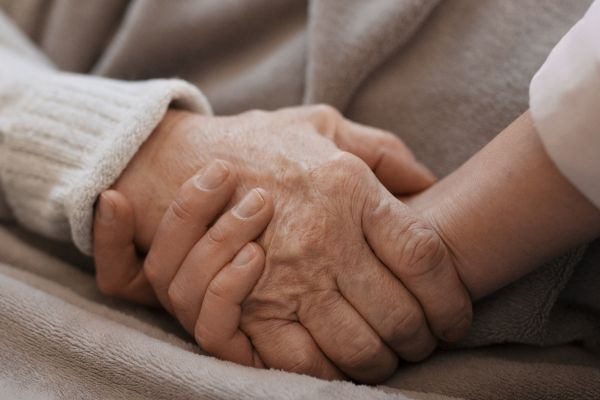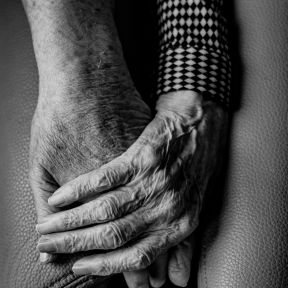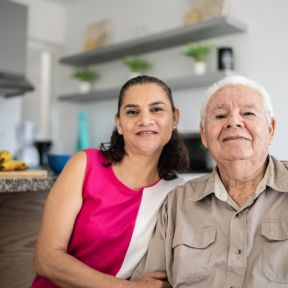
Caregiving
Caregivers provide necessary support to someone who, due to age, illness, disability, or some other factor, cannot care for themselves. Caregiving may involve shopping, housekeeping, providing transportation, feeding, bathing, toilet assistance, dressing, walking, coordinating appointments and medical treatments, or managing a person’s finances.

At least 44 million Americans provide unpaid care for an adult or child, according to a report by the National Alliance for Caregiving and AARP. Women are much more likely to take on the caregiver role, although many men do it as well. Their patients are loved ones, most often a parent, spouse, or child (of any age) with special medical needs.
To provide unpaid care is often an act of love and devotion, but it can also be a tremendous drain on one's physical and psychological resources. Caregivers frequently feel on call 24 hours a day, 7 days a week, which can cause great stress and anxiety. Caregivers must pay particular attention to their own needs, or they risk burning out and being of no use to their loved ones. One of the most influential factors in a family’s decision to move an ailing relative to a long-term care facility is the caregiver’s own physical health.
A caregiver is anyone over the age of 18 who provides needed care for another person (a child, elderly parent, sick spouse).
The act of caregiving creates an intimate, two-way relationship between the caregiver and the person needing care, which many family members find deeply emotionally fulfilling. However, a body of research finds that most caregivers are unprepared for the demands of the role and receive little physical or financial support. Before taking on the responsibility of caregiving yourself, consider the impact it could have on your mental and physical health.
An elderly adult may be resistant to the idea that they now need help; they don’t want to “hang up the keys” and lose their independence. You may need to enlist trusted others to be allies and convince them to accept help. Discuss the elderly adult’s preferences, financial situation, and necessary legal documents. It’s also good to research any available community resources.

In some cases, it makes the most sense to hire an in-home caregiver, either part-time or full-time, to help a loved one. The caregiver helps with non-medical everyday needs, such as assisting them with moving around and personal grooming, reminding them to take their medications, preparing meals, and even light housework. A paid caregiver can be hired directly or through an agency, which will vet and train them. Most states have Medicaid and other government-funded programs that can help pay for paid caregiving if certain requirements are met.
Long-term care is provided at facilities, such as nursing homes, assisted living homes, and adult day cares. There are often local options for community transportation and meal services, either for free or a low cost. Paid caregivers can be hired directly or through an agency to provide in-home support.
Some signs that an elderly adult may be in need of caregiving include: increased forgetfulness, decreased mobility, weight loss, poor hygiene, inability to drive, difficulty keeping house clean and organized, increased number of accidents or falls, and feelings of isolation or loneliness. A senior may also need a temporary caregiver when recovering from surgery or a health emergency, like a stroke or heart attack.
Caregiving services can be expensive. Most people depend on a variety of sources to help pay for them, including government programs like Medicaid, veterans’ benefits, personal funds, private financing options, tax breaks, and services through the Older Americans Act. Taking the time to research what financial assistance is available in your state and local community could easily save you thousands of dollars or more.

Caregivers and others whose work involves prolonged exposure to other people's trauma can also be vulnerable to compassion fatigue, and can experience symptoms such as exhaustion, disrupted sleep, anxiety, headaches, and stomach upset, as well as irritability, numbness, a decreased sense of purpose, emotional disconnection, and problems with personal relationships. Caregivers are also more likely to be depressed, especially when the person they care for suffers from dementia. Such individuals may secretly self-medicate with alcohol, drugs, gambling, or food.
Balancing the needs of the family and the self is key for caregivers. Experts urge family caregivers to create a plan for maintaining their health, including regular medical checkups and scheduled respite from their roles.
In the stress of helping a loved one, caregivers often forget to care for themselves. This puts them at risk of compassion fatigue, secondary or vicarious trauma, and burnout. The cost of caring without self-care is too high, making it imperative that caregivers be attuned to their own needs as well as their loved one’s.
Burnout is characterized as chronic stress, according to the World Health Organization. Over time, the caregiver’s sense of self-efficacy, idealism, and pleasure will diminish, and they will find it hard to cope. They will struggle to continue their caring duties in the meantime.
If you notice that you have a health problem, don’t wait to address it. Prioritize self-care and try to make time to do things on your own. Don’t be afraid to ask for help when you need it. If you can’t take proper care of yourself, you can’t care well for another.
More than one third of caregivers provide care to others while experiencing poor health themselves. And those responsible for multiple individuals, such as both aging parents and young children, are most likely to put their own health and personal needs behind the needs of others. For example, research has found that female caregivers are less likely to get mammograms than are other women.














